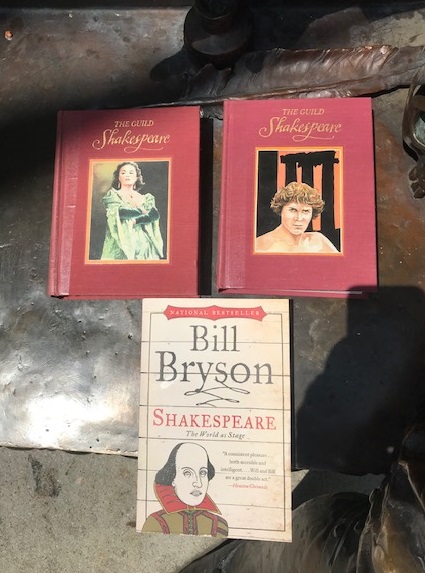Books acquired: none
Books read: “The Merry Wives of Windsor,” “Timon of Athens,” “Pericles,” William Shakespeare; “Shakespeare: The World as Stage,” Bill Bryson
As you can see above, I took the Reading Log on the road. I was reading the Bard all month, and after passing the Shakespeare bench outside Rancho Cucamonga’s Lewis Family Playhouse and Biane Public Library recently, I thought to return with my books and take the photo there. The things I do for you people! The photo at the end is on the same bench, not that it’s obvious.
I’ve been reading one or two Shakespeare plays per year the past few years, which makes him one my “annual authors” among such disparate company as Robert Benchley, H.P. Lovecraft, Jack Smith and Robert A. Heinlein. He certainly elevates the list, as he would with any such grouping.
I decided to read two plays this year, as I did last year, realizing I would never finish all his plays if I didn’t pick up the pace a bit. Rather than lug my college omnibus around once again, I went to the Pomona Public Library and checked out portable editions of the two plays I’d resolved to read: “Pericles” and “Merry Wives of Windsor.” Each edition I chose has two plays. “Wives” was paired with “Taming of the Shrew,” which I’ve read; “Pericles” was paired with “Timon of Athens,” which I believed I hadn’t. So, what the heck, instead of reading two Shakespeare plays, I read three. I was enjoying myself; once immersed in the language, the plays are easier to read, so one leads to two and two to three.
“Merry Wives” was familiar because I’d seen the LA Opera production of “Falstaff” a few years ago, and Verdi based it on “Merry Wives.” Much like Greg Brady, Falstaff tries to woo two women at once (both of them married) and suffers the consequences. It’s funny, and with a warm ending.
“Timon,” I realized a few pages in, was vaguely familiar for another reason: I’d read it in college. But as I didn’t remember much about it, I kept reading. It’s lesser Shakespeare, written with a collaborator (likely Thomas Middleton) and with a fairly one-dimensional lead character. But despite its flaws, it’s Shakespeare, so it can’t help but have some great lines.
As for “Pericles,” believed to have been written with a different collaborator (probably George Wilkins), there’s some question whether Shakespeare wrote the first two acts, or whether he perhaps only lightly revised them while doing heavy lifting on the last three acts. Anyway, this gets better as it goes along. Not great Shakespeare, but come on, it’s still enjoyable and worth reading.
Lastly, Bryson’s 200-page Shakespeare study seemed a good way to round out the month. (I considered reading something purposely different, like one of the Tarzan novels, as a joke, but that seemed willfully offensive. Let the Bard be.) Besides, I’d owned “The World as Stage” for a while — I bought it in 2011 on the cheap as Borders was closing — and was waiting to read it until I felt sufficiently interested. This was the time.
Best known as a witty travel writer, although he’s also written on other topics, like the English language, Bryson here provides a good general view of what we know about Shakespeare (very little, really) and his times while gently sending up some of the surmises others have made on flimsy or no evidence. He can be eloquent on the wonder that audiences must have felt upon hearing Hamlet’s soliloquy for the first time, or sitting through “Macbeth” wondering what would happen. And he is skeptical of many rosy claims, such as that Shakespeare famously leaving his “second-best bed” to his wife was a tribute of affection rather than an insult.
I began the month having read 16 of the plays (really 17, though I didn’t know it) and ended it having read 19, or precisely half of the 38 total that survive. That’s a nice feeling, and I look forward to next year’s reading, as even one play will mean I will have read the bare majority. I hope to read them all, of course. And then there’s the sonnets and a few poems, likewise.
How have you done regarding Shakespeare’s plays: some, many, all, none? And what did you read in May? Let us know, please, in the comments. And don’t be intimidated, though it’s hard to imagine you are; my June reading will return to the usual mishmash.
Next month: the usual mishmash.


